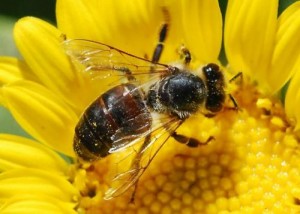Mankind has had an affectionate and symbiotic relationship with bees since the beginning of time. Einstein has been credited (alas, probably erroneously) with the suggestion that the final demise of bees will be followed within 4 years by the final demise of mankind. Naturally this relationship has been celebrated through time in beautiful art, of which Vergil’s 4th Georgic is a stunning example.
I have chosen the ‘Bees-at-War’ passage to represent this poem for many reasons.
As a Classicist I especially enjoy the humourous and artistic tension between form (grand epic style) and subject matter (tiny bees, albeit ‘at war’). Vergil ‘inflates’ a magnificent epic ‘balloon’, only to ‘puncture’ it in line 87 when the apparently magnificent combatants are easily quieted by a tiny handful of dust, ‘pulveris exigui iactu’.
I have often found this latter image comforting in daily life too. When we see colleagues, friends or society even, worrying, possibly too much, about matters which are small in the greater scheme of things, we should remember how serious their battle is to Virgil’s bees, and yet how small an amount of dust disperses them.
Bees are current today as well, as a metaphor for our modern contempt for our natural heritage. Bees are in serious decline globally, and we, supposedly their old friends, are the likely culprits, e.g for the rampant use of neonicotinoid pesticsides (article in a recent Nature magazine: http://www.nature.com/news/the-buzz-about-pesticides-1.11626).
Ian Peel
Sin autem ad pugnam exierint, nam saepe duobus
regibus incessit magno discordia motu,
continuoque animos vulgi et trepidantia bello
corda licet longe praesciscere; namque morantes 70
Martius ille aeris rauci canor increpat et vox
auditur fractos sonitus imitata tubarum;
tum trepidae inter se coeunt pennisque coruscant
spiculaque exacuunt rostris aptantque lacertos
et circa regem atque ipsa ad praetoria densae 75
miscentur magnisque vocant clamoribus hostem.
Ergo ubi ver nactae sudum camposque patentes,
erumpunt portis; concurritur, aethere in alto
fit sonitus, magnum mixtae glomerantur in orbem
praecipitesque cadunt; non densior aëre grando, 80
nec de concussa tantum pluit ilice glandis.
ipsi per medias acies insignibus alis
ingentes animos angusto in pectore versant,
usque adeo obnixi non cedere, dum gravis aut hos
aut hos versa fuga victor dare terga subegit. 85
Hi motus animorum atque haec certamina tanta
pulveris exigui iactu compressa quiescent.
But, if haply for battle they have gone forth – for strife with terrible turmoil has often fallen on two kings; and straightway you may presage from afar the fury of the crowd, and how their hearts thrill with war; for the warlike ring of the hoarse clarion stirs the loiterers, and a sound is heard that is like broken trumpet blasts. Then, all afire, they flock together: their wings flash, they sharpen their stings with their beaks and make ready their arms. Round their king, and even by his royal tent, they swarm in throngs, and with loud cries challenge the foe. Therefore, when they have found a clear spring day and open field, they sally forth from the gates. There is a clash; in high air arises a din; they are mingled and massed in one great ball, then tumble headlong: no thicker is hail from the sky, not so dense is the rain of acorns from the shaken oak. In the midst of the ranks the chiefs themselves, with resplendent wings, have mighty souls beating in tiny breasts, ever steadfast not to yield, until the victor’s heavy hand has driven these or those to turn their backs in flight. These storms of passion, these savage conflicts, by the tossing of a little dust will be quelled and laid to rest.
Chosen by Ian Peel. The translation is from theoi.com
The above text is provided by the Perseus Digital Library.


No Comments